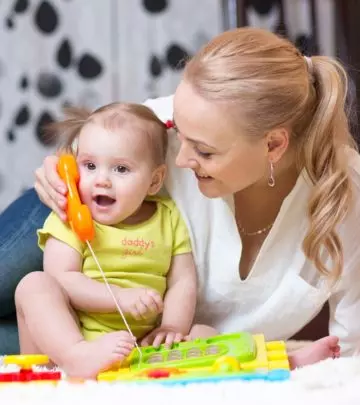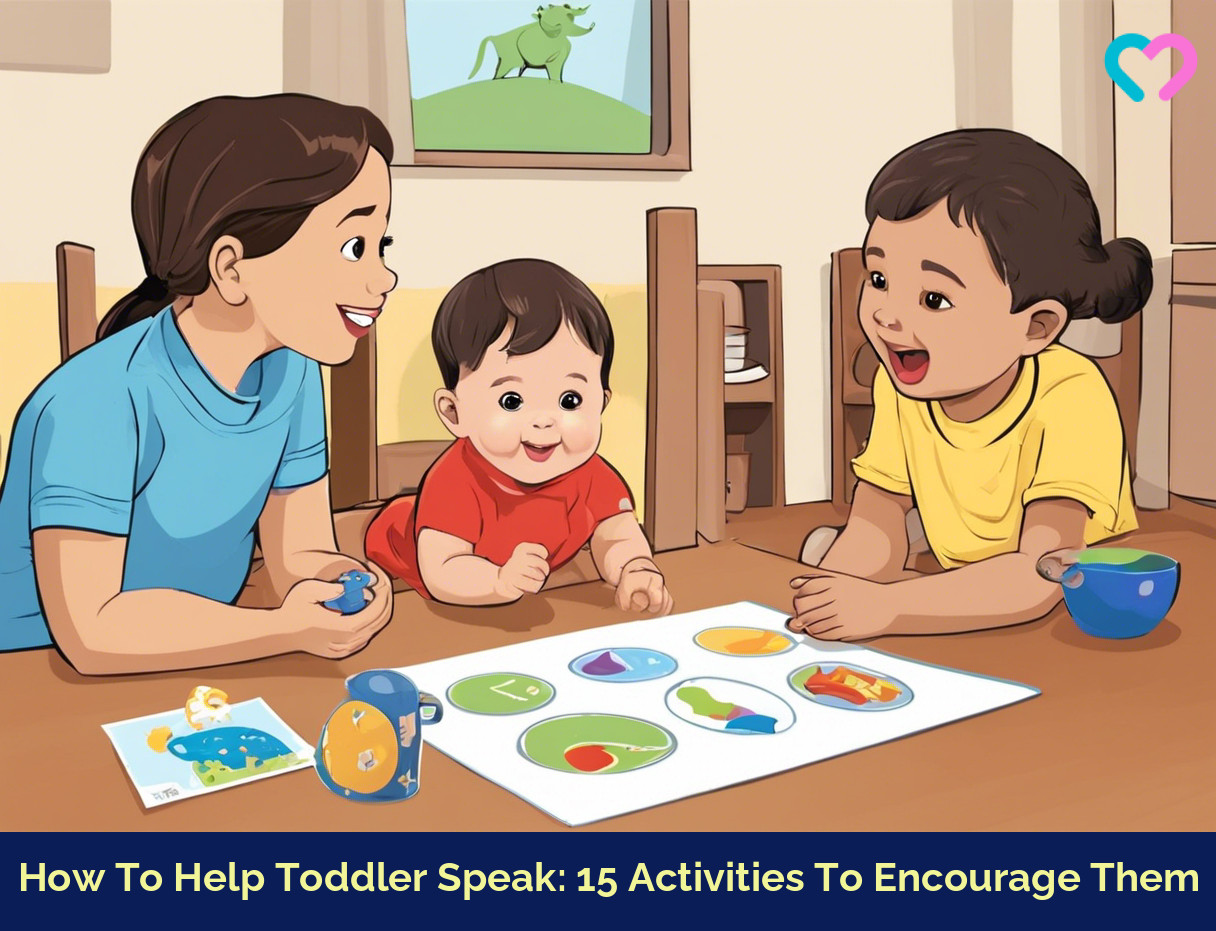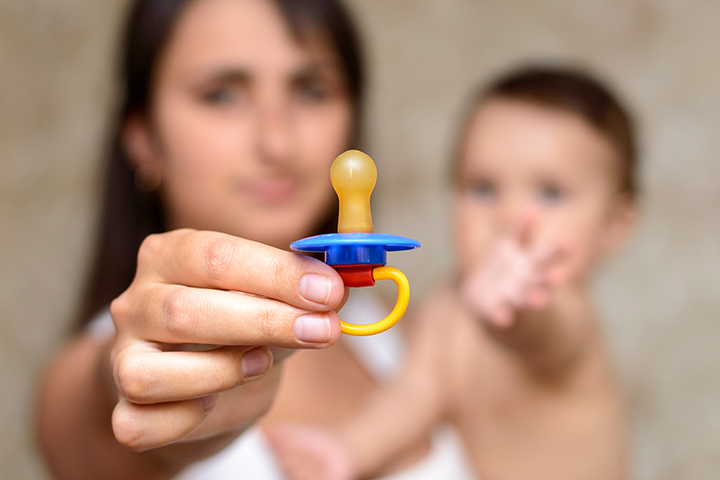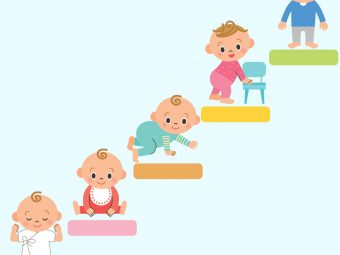
Image: Shutterstock
Parents cannot wait to hear their babies say “mama” or “dada” as soon as they become toddlers. If you feel the same way, you could try some activities to encourage toddler-speak.
Experts at the Centers for Disease Control and Prevention explain that babies begin to utter sounds before speaking their first words at around one year (1). Their language skills develop and become more refined as they move from infancy to toddlerhood (2).
Read this post as we talk about the stages of language development in babies and some games to help your toddler speak fluently.
Language Development Milestones
Image: IStock
The following are the age-defined stages of language development and achievement of speaking according to the American Speech-Language-Hearing Association (ASHA) (3).
- Stage 0 to 6 months: Babies of this age group understand that you are speaking and acknowledge your voice. They respond to their names, make cooing and babbling sounds, along with crying to communicate with adults.
- Stage 7 to 12 months: Babies in this age understand simple words like “yes” and “no.” They may try saying something similar to words but are unable to speak until one year old. The baby may often use gestures to communicate.
 Quick fact
Quick fact- Stage 13 to 18 months: Around this age, the toddler’s vocabulary includes 10 to 20 words. This is the time they start repeating and chanting what you say. They understand simple phrases and commands like “pick up the ball.”
- Stage 19 to 24 months: The vocabulary of your toddler may have expanded to 50+ words till this age. They usually can name objects, body parts, differentiate colors, and form short phrases or sentences.
- Stage 25 to 36 months: By the time your toddler is between two and three years of age, they may have a vocabulary of 250+ words. They can now indulge in active conversations with you, asking questions, requesting objects, and understand your directions properly.
Activities To Help Toddlers Talk
Parents can try various enjoyable activities to exercise the toddler’s speaking skills. The more exposure to new words, the more will be the chances of picking them.Indulge in activities that the toddler enjoys; repetition and consistency are the keys for maximum effectiveness (4).
The following are some fun-filled activities that you could consider trying with babies and toddlers.
- Sing to them: Try finding a favorite song that your baby enjoys. Sing songs to the baby while they play in their crib or while you hold them in your arms. Choose songs with easy words and a catchy tune.
Image: IStock
- Recite nursery rhymes: Nursery rhymes are intended to attract the attention of a toddler. These have easy-to-understand meanings with short, interesting stories and rhyming sentences with pleasant tunes for quick grasping.
- Tell stories: This is one of the most effective ways to bond with your baby or toddler. As you tell stories, babies are likely to take up your language and culture swiftly. Story telling will also enhance the toddler’s imagination.
- Read to them: Reading out small sentences for the baby regularly so will help them to understand and repeat them effortlessly. Statements should have meanings, and the words should be easy to utter.
Image: IStock
- Watch some good baby TV shows: There are many baby TV shows that can help your little one learn new words, numbers, and small phrases. Babies connect with the cartoons quickly, as it ‘s enticing for them, with cute voices and sounds. This activity should be limited to an hour a day.
- Talk to your baby: Start with sharing about your day or describing your routine chores. Sit with the baby or toddler at home or take them to the garden and narrate everything happening around. This will help them take up new words faster, along with the meaning of those words.
 Experts say
Experts say- Respond to the child’s actions: Babies and toddlers love pretend play. If you find them pretending to be driving, ask them where they are going and what will they do there, or will they take you along? If your toddler hands you an object, ask them to describe the object in their own words.
- Try mimicking your child’s attempts at words: This will build a two-way conversation between you and the baby, and the baby will feel encouraged to speak further. It may make them feel that you can understand them and, thus, they will attempt talking more with you. Try not to correct them much, as it’s their learning period.
- Try building-up words: If the toddler says “apple,” you can say “yes, it’s a juicy red apple,” or if they try saying “elephant,” you can say “a large elephant.” This helps teach them to include newly learned words into meaningful phrases.
- Point and ask: Point at the nose and ask what it is? Wait for a moment to give the toddler a chance to answer. If they don’t answer, give them a prompt. If they answer it correctly, encourage them by saying, “yes, that’s the nose.” This will help them understand the specific names of the objects. You can use flashcards too.
Mother of four and Youtuber Kaleigh Carnahan shows how daily interactions and regular home activities may be harnessed to increase toddlers’ vocabulary. The family’s daily interactions with their toddlers include saying the animal’s name while reading a book together, uttering the words ‘on’ and ‘off’ when switching the lights on, and narrating the steps of decluttering the playroom when clearing up toys together to associate words with objects (i).
Image: IStock
- Create situations for talking: This can be done when there are opportunities, such as when the baby wants you to give them a toy. The baby will try asking your help to get the toy. If the toddler begins to point rather than talk, ask them if they want it by saying, “do you want the yellow car?”. While handing it to them, say, “here is your yellow car.”
- Try playing forgetful parents: This game encourages the baby to remind you about things you pretend to forget. For instance, if it is time to go outdoors, pretend that you forgot to put on the toddler’s shoes. The toddler is quite likely to notice it and point it out to you. When they do, ask them, “did I forget something?”. It will encourage them to express themselves with words rather than actions.
- Name everyday things repeatedly: Say the name of each item the baby uses in a day. For instance, when giving the toddler their sippy cup, say, “here is your sippy cup.” Name the foods they eat or their toys, and soon they will start speaking those names, too.
- Speak with excitement: Toddlers get excited when they see parents excited. It prompts them to imitate you when they notice your happy words and expressions. Try using exaggerated facial expressions, sounds, and gestures to encourage the little one to repeat what you say.
- Let toddlers socialize: Give your toddler an opportunity to make friends and interact with other toddlers. When they see other toddlers of similar age, they could feel encouraged to talk.A few great places for your toddler to socialize are the local parks, family gatherings, playgroups, and daycare.
- Narrate your day: Narrating your daily activities and engaging them in conversation encourages toddlers to talk. Whether doing household chores, getting dressed, preparing meals, heading out, playing with the pet, or going about your day, narrate each step audibly. For instance, say, “Now, we’re washing the dishes,” or “Next, we’re heading to the store.” Focus on spending the day together and create an enriching linguistic environment for your child. The constant communication will prompt your child to make an effort to talk. You may also ask your child questions about the ongoing tasks. This activity helps expand their vocabulary and refine their pronunciation.
What To Avoid When Toddler Is Learning To Speak?
Image: IStock
Avoid the following habits to reinforce the correct pronunciation of words and improve a toddler’s vocabulary.
- Baby talks: If you hear the baby babbling, repeat the actual word instead of using baby talk. It will make them understand the correct pronunciation. For example, if the kid says “baa” while asking for the bottle, say “bottle” and then give it to them.
- Speedy talks: Give your baby or toddler time to understand the words you speak. Talk slowly and stress on words to help the baby grasp the correct pronunciation. Speedy talks may confuse the toddler since they are still learning to understand the language.
- Overuse of pacifiers: Constant use of pacifiers or a thumb-sucking habit may inhibit the development of speech. Doctors at the American Academy of Pediatrics strongly recommend toddlers stop using pacifiers by two years (5). If your toddler’s habit of using the pacifier or thumb-sucking is persistent, speak to a pediatrician.
- Respond to only gestures: Encourage your toddler to speak up to convey their messages instead of responding to their gesturing immediately. Avoid motivating the toddler to use only gestures to communicate. If your toddler struggles to communicate, help them out by asking questions to which they can respond and communicate.
- Excessive screen time activities: Limit screen time to an hour of high-quality content, which can help improve the toddler’s language skills (6). Accompany your toddler whenever they use a device with a screen, such as television, smartphone, or tablet.
 Did you know?
Did you know?Each baby and toddler develops at their own pace. Therefore, do not panic if you see other toddlers speak a lot while your toddler is still learning a few words. If your little one has achieved their previous developmental milestones, they will achieve their speech-related milestones, eventually. Nevertheless, there could be certain scenarios when it is good to see a doctor.
When To See A Doctor?
Consult a pediatrician if the toddler(1) (7) (8):
- Does not speak simple single words by the age of 12 months.
- Does not speak at least six words by the age of 18 months.
- Does not follow simple instructions or use simple phrases, or does not know the name of common items, such as bottle and brush, by the age of 24 months.
Frequently Asked Questions
1. Is it normal for a 2-year-old to not talk?
Language delays are one of the most common types of developmental delays and can be seen in about one in five children. While simple speech delays are temporary, at times, speech delays may indicate serious underlying conditions such as learning problems, hearing loss, or autism spectrum disorder. Consult your doctor if you think your child is exhibiting signs of speech delay (9).
2. At what age is speech delay likely to resolve on its own?
About 70 to 80 percent of children who begin to talk later than their peers may start talking by the time they begin school (10).
3. Can a toddler have a speech delay and not be autistic?
Yes. There could be many possible reasons behind speech and language delays in a toddler. Some possible reasons are developmental speech and language disorders, hearing loss, premature birth, auditory processing disorder, apraxia of speech, selective mutism, neurological problems, and neglect or abuse (11).
Toddlers generally start speaking a few words by the time they turn 18 months, but not all children fall into the same category. Every child learns differently, and you must recognize and accept their abilities. That said, if you want to know how to help your toddler speak, you may introduce some interesting activities, such as singing, reciting rhymes, and pointing and asking. These activities will encourage children to talk and communicate more effectively. Remember to stay calm while your child learns to speak. Encourage them as they achieve small milestones. However, be observant; talk to your doctor if your child doesn’t speak anything by 12 months.
Key Pointers
- A toddler usually learns to speak about 10-20 words after 12 months of age.
- Parents can tell stories, recite poetries, or read to them to exercise the toddler’s speaking skills.
- Encourage toddlers to speak by telling stories to parents and speaking with excitement but avoid baby talks and fast-talking.

Image: Stable Diffusion/MomJunction Design Team
Discover effective techniques to help your toddler talk in this informative video from an acclaimed speech therapist. Get ready for your munchkin to talk your ears off.
Personal Experience: Source
MomJunction articles include first-hand experiences to provide you with better insights through real-life narratives. Here are the sources of personal accounts referenced in this article.
i. How to teach a baby to talk | speech activities for babies & toddlers | tips for parents | CWTC;https://youtu.be/dRgljdw2eu8?feature=shared
References
1. Important Milestones: Your Child By One Year;Centers for Disease Control and Prevention
2. Speech development in children; Healthdirect, Australia
3. Activities to Encourage Speech and Language Development; American Speech-Language-Hearing Association
4. Tips on Learning to Talk; Zero to Three
5. Pacifiers and Thumb Sucking; American Academy of Pediatrics
6. Where We Stand: Screen Time; American Academy of Pediatrics
7. Important Milestones: Your Child By Eighteen Months;Centers for Disease Control and Prevention
8. Important Milestones: Your Child By Two Years;Centers for Disease Control and Prevention
9. Language Delays in Toddlers: Information for Parents; American Academy of Pediatrics
10. Do Late Talkers “Grow Out of It?”; The Hanen Centre
11. Speech and Language Development; CS Mott Children’s Hospital

























